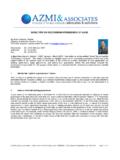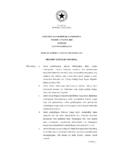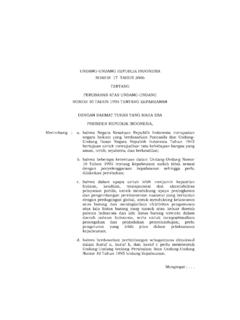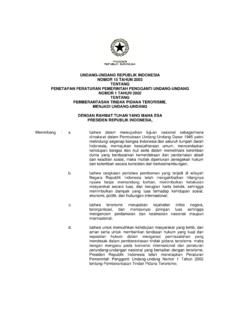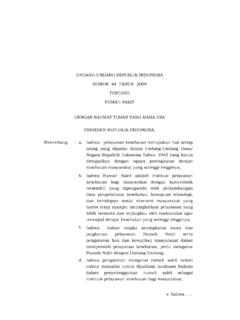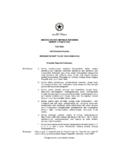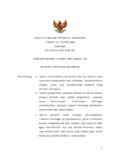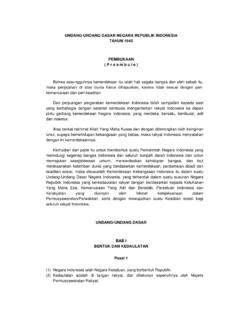Transcription of THE EXTENT OF LAND OWNERSHIP BY FOREIGNERS IN …
1 2008 Azmi & Associates The EXTENT of land OWNERSHIP By FOREIGNERS In indonesia - 00078786 \ @Azmilaw #7 Page 1 Of 4 THE EXTENT OF land OWNERSHIP BY FOREIGNERS IN indonesia By: Astried Songgod Melati Simangunsong Paralegal +603 2118 5155 Introduction The basis of modern Indonesian land Law is Law Number 5 year 1960 (UU 5/1960), also referred to as UUPA (Undang-Undang Pokok Agraria/the Basic Agrarian Law Act). UUPA not only regulates agricultural land , but all land in indonesia , ranging from urban land , forests, rice lands, plantations, mines, and coastal waters including fisheries.
2 Significantly Article 33 Section 3 of the Indonesian Constitution (Undang-Undang Dasar 1945/UUD 1945) forms the basis of framing the basic assumptions of the new land Law of 1960. It stipulated: "Bumi, air dan kekayaan alam yang terkandung di dalamnya dikuasai oleh Negara dan dipergunakan untuk sebesar-besar kemakmuran Rakyat . Meaning that the land , waters and natural wealth contained within them are controlled by the State and shall be utilized to increase the prosperity of the People. The Basic Agrarian Law (UUPA or Law No. 5/1960) created a uniform system of land rights throughout indonesia .
3 UUPA is viewed by Indonesian legal scholars as an expression and execution of the aspirations declared in Article 33 Section 3 of the Indonesian Constitution. As such, it is impossible under the UUPA for foreign individuals or foreign legal entities to legally own or use land in indonesia . land titles under the Basic Agrarian Law are classified as primary titles, , those granted by the holder of a primary title. A. Primary land Titles All primary land titles are certified and registered with the National land Agency (Badan Pertanahan Nasional/BPN). Forms of land title in indonesia are regulated by the UUPA (Law No.)
4 5/1960) and issued by the National land Board as follows: 1. Hak Milik/HM (Right of OWNERSHIP ): Hak Milik is the most complete form of land OWNERSHIP in indonesia . Subject to zoning restrictions, the holder can use the land for any purpose, although it does not entitle the owner to exploit the natural resources found on or under the land . The right to exploit the natural resources is regulated by the basic Mining Law (Law No. 11/1967). Based on Article 21 of UUPA No. 5/1960 the only ones who may hold this title are Individuals of Indonesian nationality and special bodies stipulated by the government, government banks, cooperatives and religious and social bodies.
5 Consequently, neither limited liability companies (PT/Perusahaan Terbatas) nor foreign individuals may obtain land with an HM title. The title has no time limit and may be sold, gifted, exchanged and bequeathed. Hak Milik may be made the subject of a security interest in the form of a mortgage (Hak Tanggungan). The holder of a Hak Milik may also grant inferior titles over the land to third parties, while retaining the reversionary rights. 2008 Azmi & Associates The EXTENT of land OWNERSHIP By FOREIGNERS In indonesia - 00078786 \ @Azmilaw #7 Page 2 Of 4 2. Hak Guna Bangunan/HGB (Right to Build): The holder of Hak Guna Bangunan is entitled to construct and own buildings or other structures on the land in state-owned land (Tanah milik negara), HM (Hak Milik) land , and HPL (Hak Pengelolaan) land .
6 This is the most common title for residential, commercial and industrial properties. According to Article 21 of Government Regulation No. 40/1996, Individuals of Indonesian nationality, and Indonesian legal entities including Foreign Capital Investment (Penanaman Modal Asing-PMA) and Domestic Capital Investment (Penanaman Modal Dalam Negeri-PMDN) companies can own this title of Hak Guna Bangunan (HGB). Thus, any legal entities such as limited liability companies (Perusahaan Terbatas/PT) which are established under Indonesian law and domiciled in indonesia may obtain HGB (Hak Guna Bangunan).
7 Basically, the right is granted for an initial period of up to 30 years, although it may be extended for a further 20 years. Based on Article 25 of Government Regulation No. 40 year 1996 regarding Hak Guna Usaha, Hak Guna Bangunan and Hak Pakai, an approved capital investment company ( , a PMA or PMDN Company) may obtain HGB rights for a period of 80 years ( , 30-year initial term, plus 20-year extension term, plus 30-year renewal term) by payment of certain up-front official costs (Uang Pemasukan). Likewise, HGB can also be sold, gifted, exchanged, bequeathed by an Indonesian, and/or encumbered by a mortgage.
8 B. Hak Guna Usaha/HGU ( land Cultivation Rights Title): HGU may be owned by Indonesian citizens or by corporations established under Indonesian law and domiciled in indonesia . HGU gives the right to use a state-owned land for the purpose of agriculture; in particular agricultural projects, including plantations, fisheries and cattle ranches. FOREIGNERS and foreign legal entities, in principle, cannot be granted an HGU. However, Foreign Capital Investment Companies engaging in agriculture are permitted to obtain an HGU, even if they are 100% foreign-owned. Such title is granted for a period of 30 years, and may be extended for a further 25 years.
9 The provisions of Government Regulation No. 40/1996 also apply to HGU titles, thereby allowing PMA and PMDN Companies longer-term certainty with respect to their land rights. According to Article 5 of the Government Regulation No. 40/1996, HGU titles cannot be granted on areas less than five hectares in size and special rules apply for areas over 25 hectares. This right can also be sold, gifted, exchanged, bequeathed, and/or encumbered. C. Hak Pakai (Right of Use): This is the right to use and/or harvest from land directly owned by the state, or private land by the agreement with the owner of the land .
10 Hak Pakai entitles the holder to use the subject land for specific purposes described in the deed of conveyance. Foreign individuals and foreign representative offices, as well as Indonesian citizens and legal entities, are entitled to hold Hak Pakai titles. Traditionally, this title has been granted to various foreign governments, religious and social institutions, ( embassies, consulates and churches) for an indefinite period as long as the premises continue to be used for the agreed purpose. In Article 45 of Government Regulation No. 40/1996, Hak Pakai for most commercial uses can be granted for up to 25 years and extended for another 20 years, and like HGB and HGU a longer term of fixed rights may be obtained by an up-front payment of the Uang Pemasukan.

